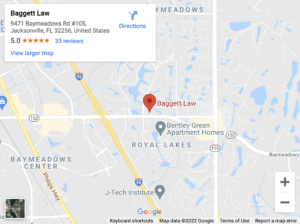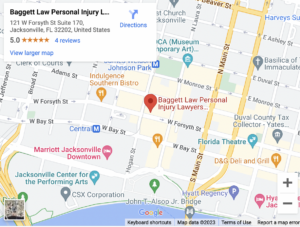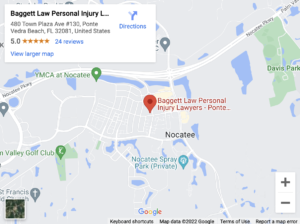
Did you sustain injuries in an accident in Florida caused by another party’s actions? If so, you might consider filing a personal injury claim to recover compensation for your losses.
However, you have limited time to file a civil claim for damages. It’s essential to monitor the statute of limitations that applies to your case to ensure that you preserve your right to financial recovery from the at-fault party.
If you miss this vital deadline, you’ll forfeit the ability to seek compensation in a personal injury lawsuit.
What Is a Statute of Limitations?

Statutes of limitations set deadlines for filing legal matters. They exist for both criminal and civil cases. If a claimant doesn’t file a lawsuit within the statutory deadline, they lose their right to pursue damages in a court of law, and their claim is no longer valid.
In a civil matter, the time typically starts to run on the date of injury. However, in some cases, the time begins on the date the injury was discovered (or reasonably should’ve been discovered).
Why Does Florida Enforce Statutes of Limitations?
Florida and other states have many valid reasons to impose statutes of limitations, including:
- To encourage injured people to timely file their claims
- Evidence may become stale or lost (e.g., memories fade over time)
- Eyewitnesses may forget details of the accident or disappear
- To prevent courts from becoming inundated with lawsuits
- To prevent someone from suing for an old injury because they need money
Filing a personal injury lawsuit as quickly as possible is the best way to ensure that the evidence is fresh and compelling.
What Is the Deadline for Filing a Personal Injury Lawsuit in Florida?
The Florida government recently changed the statute of limitations for most personal injury cases (those based on general negligence). There is a four-year deadline for accidents happening on or before 3/23/2023, and a two-year deadline for those that happen after that date.
These deadlines typically apply to the following cases:
- Car accidents
- Truck accidents
- Motorcycle accidents
- Accidents involving bicyclists and pedestrians
- Slip and fall accidents
- Dog bites
- Product liability
Some exceptions to the four-year statute of limitations are as follows:
- Wrongful death – claimants must file a wrongful death lawsuit within two years of the decedent’s date of death (which may be different than the accident date)
- Medical malpractice – claimants must file a medical malpractice claim within two years of the injury or discovery date (but no longer than four years from the incident, or seven years if it involved fraud, concealment, or intentional misrepresentation)
- Nursing home abuse – claimants have two years from the injury or discovery date to file a nursing home abuse case (but no longer than four years from the incident, or six years if there was concealment or intentional misrepresentation)
The discovery rule applies in Florida medical malpractice and nursing home abuse cases. That means the statute of limitations doesn’t start to run until the claimant discovers (or should’ve discovered) the injury.
However, the claimant will be unable to file a claim after four years from the incident (or longer if there was concealment, fraud, or intentional misrepresentation), even if they haven’t yet discovered the injury.
Tolling the Statute of Limitations in Florida
The discovery rule isn’t the only circumstance that will toll – or pause – the statute of limitations.
Under Florida state law, the following will also extend the statute of limitations:
- The defendant is out of the state
- The defendant has been using a false name and cannot be served
- The defendant is hiding or unable to be located
- The plaintiff is mentally incapacitated
- The victim is a child (under the age of 18)
Tolling can be a complicated concept. Don’t automatically assume that you qualify for an extension of time. Contact a personal injury lawyer to confirm the deadline that applies to your situation.
How Does the Statute of Limitations Affect Settlement Negotiations?
Many personal injury lawsuits start as insurance claims. Insurance adjusters often drag their feet or engage in delay tactics, hoping you’ll be unaware of the statute of limitations in your case.
If the statutory deadline passes, you’ll be barred from pursuing a financial recovery in court. Additionally, you’ll be unable to force the opposing party to pay for your damages, essentially losing your ability to negotiate or compel an agreement.
If you’re negotiating with an insurance company without an attorney’s assistance, be sure to monitor the statute of limitations. If you cannot reach a favorable out-of-court settlement, you can file a formal civil lawsuit with the court to preserve your right to compensation.
Even if you file a lawsuit, you can still settle the case anytime before a jury renders a verdict. If your case gets to this stage, it’s best to retain an attorney to represent you in court and ensure that all legal pleadings and documents are filed correctly.
Filing a Claim Against the Government in Florida
In some cases, a government actor (e.g., a state employee) may be the defendant in a negligence case. Injured people can file a claim against a government agency under the Florida Tort Claims Act.
However, the procedures and filing deadlines are different in these cases. You must present a written notice of claim to the government within three years of the date of injury (or two years if it involves wrongful death).
Once you’ve put the appropriate agency on notice, they have six months to investigate the allegations and respond. During that time, you cannot file a formal lawsuit against the government unless they deny your claim.
If your claim involves a state or local government entity, contact a personal injury attorney for help. They’ll ensure that you follow the necessary procedures and file your documents timely.
Contact a Jacksonville Personal Injury Lawyer To Discuss the Statute of Limitations that Applies To Your Case
In some cases, it’s fairly straightforward to determine the applicable statute of limitations. However, in others, it’s more difficult and may require the assistance of an experienced attorney.
If you’re unsure what deadline applies to your claim, contact a Jacksonville personal injury attorney from Bagget Law Personal Injury Lawyers to discuss what happened and who was involved at (904) 396-1100.
Regardless of the statute of limitations, it’s always best to consult a legal professional as soon as possible after the accident or personal injury. This will ensure that your attorney can investigate, gather solid evidence, and start negotiating on your behalf to reach the best outcome possible.




